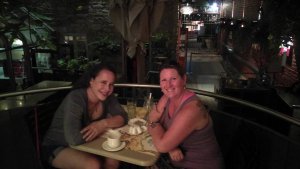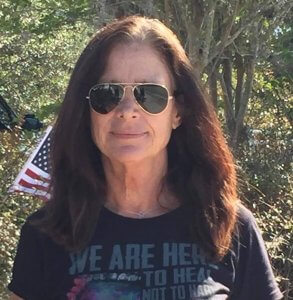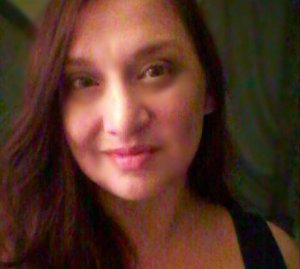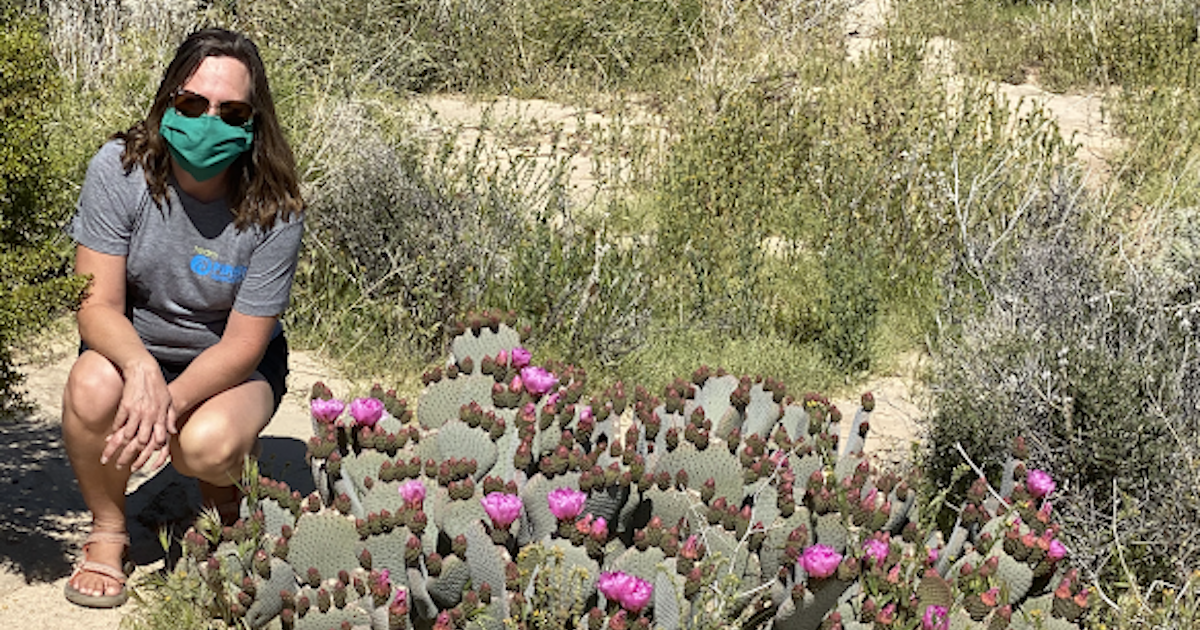Concerns about my health: both concrete ("Why won't this headache go away?") and general ("Will I survive this crisis?"). Constant worry about friends who are sick. A sense that bad news could crop up at any time; heightened awareness of my vulnerability, physical and emotional; and a fervent drivesometimes anxiety-provoking itselfto focus on what's important and make the most of each day.
RELATED: Mental Health Resources for Cancer Survivors During the COVID-19 Pandemic
Read More
And in my personal life, and certainly in the world at large, COVID-19 has brought too much tragic loss and painful grief.
Déjà vu, I've found myself thinking. On one hand, having faced much of this in the context of cancer means I know how to face it, at least as much as that's possible to know. On the other hand, my energy reserves for a situation like this are low, and I feel exhaustedforced back into these emotions at full, immediate intensity.
I was considering all this when, a few days ago, I got a note from a cancer-survivor friend, Veronica (pictured in top photo). She was checking in and asking if I, too, am having what could be called "cancer flashbacks" now. Veronica was diagnosed with breast cancer at age 33, in 2006. She has been in mostly good health since her surgeries and treatments; but like me and like so many survivors, she has experienced many related losses. In fact, she and I became more tightly bonded in 2010 when we lost Erin, a beloved friend of both of ours, to breast cancer.
I told Veronica I'd been feeling the same way and asked if she could express more about the parallels she sees.
"I vividly remember standing at the window of my house," she answered, "watching cars on their way to work when I was recovering from my first chemo treatment and still struggling with post-surgery nerve pain. I had tears running down my face, because I hadn't realized how tied up my identity was in my work and how being cooped up in the house would wear me down. Then, it felt like only my community of young cancer survivors understood that. Now the whole world is having to deal with what it feels like to say home and how isolating and unnerving that can be."
"Then, when we could go out," she continued, "we had to be so cautious about getting sick. I did chemo during flu season, and I was so annoyed at people who came to work sick. Trying to keep myself healthy, to keep my treatments on schedule, was exactly what it feels like to go to the grocery store now."
Veronica has noticed, as I have too, that a phrase often used in cancer survivorship is being used with COVID-19 now.
"As soon as they started talking about 'the new normal' on TV and what that might look like," she said, "I wanted to reach out to you. Just the words 'new normal' give me a PTSD feeling. Honestly, I don't think most people are ready for any sort of 'new normal.' It's a real process to get there. Like you, I have a 'new normal' that stares me in the face every day when I take a showerbut years later, I can still have sadness about it."
"Another part of my 'new normal' as a young adult having had cancer," Veronica said, "was losing friends who were previously vibrant and healthy. It still feels like a sucker punch when that happens. I've had to cope with the fact that even inside these giant glass-walled hospitals filled with machines, medicines, and some of the most brilliant people, we can find that modern medicine can't cure everything. That's a hard pill to swallow, and we're all experiencing it right now in terms of COVID-19."
Yes, indeed.
Ultimately, she said, "having had cancer taught me acceptance, including acceptance of living with a constant level of uncertainty. I learned to accept that modern medicine does what it can with what it knows at the time, and sometimes that's not enough; acceptance that life might not work out exactly as I planned, but I will still have so many joyful moments; acceptance that I'll lose friends who tried just as hard to live as anyone else, and sometimes even harder. I learned that I needed the community of other survivors, even if that community can bring sadness in losing friendsand that I needed to find ways to give back later. All those things are helping me cope in this global crisis, too."
Veronica's perspective seemed so wise; and indeed, her current life is bearing the fruit of lessons learned. Divorced after treatment, she has since remarried ("I actually found a great guy!" she says). Her husband retired from the military in 2018. By living carefully, Veronica is currently able to travel the country with him full-time in their RV. (Obviously, their travel is a bit more limited at the momentbut it will resume.)
Inspired, I reached out to other survivor friends for their views on facing this pandemic. I found an understandable mix of "I know I can do this" and "ReallyI have to do this again?"
‘Cancer Taught Me to Live in Isolation’
"I’m more afraid of COVID-19 because of cancer," says my friend Julie. "I’m eight years from diagnosis, but my immunities are shot. I didn’t spend two years and nine surgeries fighting cancer to get COVID-19 and die from it! I’m back to that paranoid feeling about every ache and pain, except now it’s every sneeze or chest pain is this virus. I’m a single mom with a deadbeat ex. I cannot die and leave my child with him."
Still, Julie's experience with cancer lends her strength at this time.
"I’m grateful for this life and try to find the silver lining in everything," she says. "I’m taking advantage of the downtime I have by sewing masks for others, baking new cupcake flavors, ding-dong-ditching friends and leaving treats on their doorsteps, taking my dogs for walks, cooking meals I’m normally too tired to cook, and sometimes just binge-watching Netflix. Cancer taught me how to survive isolation and make the best of a horrible situation. That's just one of the silver linings of having lived through it."
Coping With This ‘Surreal’ Reality
"I have lifelong side effects from treatment that make me high risk for COVID-19," says Jennifer, who finished chemo 13 years ago. "Every coughing fit, I wonder if it's the virus, where before it was just my chronic cough, which is bad enough. Memories of washing hands and wearing masks while in chemo are coming back now. I see healthcare workers in full gowns, masks, and gloves, and I flash back to how they dress that way to give us certain chemo drugs. It's surreal."
Marcia notes that she never stopped being more careful about catching bugs or viruses after treatment: "Some of the personal-protection habits I picked up during chemo became a part of my everyday life. Once life has turned out to be so fragile, we tend to stick with proven protocols."

"As cancer survivors," Sabrina adds, "we have had to face our own mortality. Now the general population has to as well. Those not following the stay-at-home orders are the ones who can't deal with it and are in denial."
"This may sound odd," says Shelly, "but I made peace with dying during my treatments. So I’m not afraid of the virus for myself, but I worry about everyone else getting it. I’m really terrified that my son [now a young adult] could get it. The idea of not being able to be with him if he went to a hospital is scary."
This strikes me as very enlightened, but it also startles me a bit. I didn't during treatment, and haven't yet, made peace with the prospect of my dying anytime soon.
Kathryn says that cancer helped open her heart.

"The thing I learned about surviving cancer is that I did not survive it by myself," she says. "I was saved from it by countless people in countless ways. Some of them I knew well, some in passing; some I will never meet, nor realize how they played a part. Each one, though, was integral to me being here today. I was saved by their dedication to the idea that life is most worth saving."
"The sisters we lost didn’t fail to survive," Kathryn continues. "We failed to save them. We have to use that knowledgenot to place blame but to continue to dedicate ourselves to saving one another. The value we place on humanity and its survival is evident in our dedication to saving one another. Seeing it again now, on a scale that is unfathomableI can’t help but love people even more."
I have tears in my eyes reading this note from Kathryn, and her last sentence increases them: "You girls [of our survivor community] are of course a part of what saved me. We've been alone together before."
Heather is living with stage 4 breast cancer and admits to some very relatable frustration about current restrictions.
"I feel like what everyone is experiencing is like dealing with a cancer diagnosis," she says. "The uncertainty and fear, the physical and sometimes emotional isolation. As a metastatic patient, I struggle knowing that I have three trips scheduled for this summer that may be cancelled. I want to chase my dreams. But then, I feel selfish thinking that way, when people are dying all over."
Some moments in Jenny's current life echo her life in treatment in especially poignant ways.
"When I went through chemo in 2008," she says, "I used to spend hours in a hammock on my deck watching leaves blowing in the wind. I couldn’t tolerate Neulasta [which helps to prevent infections during chemo], so I had to quarantine. I felt as though I’d stepped out of time. I had an inclination to be still and quiet. It helped me through. Somehow, I never really got back in that hammock once I was well and out moving again. Last week, I bought another hammock. This morning, I lost someone who is important to me personally and professionally, and I’ve been unable to work all day. I'm just sitting here, literally as I write this, in my hammock, watching the leaves rustle in the wind."
I return to Veronica's wordsthe perspective that inspired me to write this piece. "Adjusting to the 'new normal' is a process, but it's not a linear one," she wrote to me. "It's something cancer survivors have navigated in different ways, but we've found our footing. Sometimes, like when a friend dies, that footing feels loosebut I run through the process of grief, acceptance, adjustment, etc., and find balance again."
Learn more about SurvivorNet's rigorous medical review process.


